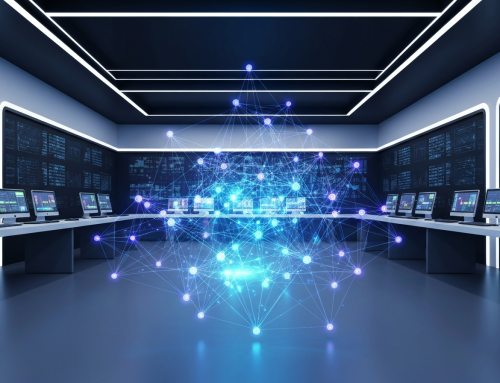The Dawn of Intelligent Business Automation
The business landscape is undergoing a profound transformation, driven by the emergence of advanced automation technologies. At the forefront of this evolution are AI Agents, intelligent software systems designed to autonomously perceive their environment, make decisions, and execute tasks to achieve specific goals. Unlike traditional automation, which often relies on rigid, pre-programmed rules, AI Agents possess the capability to learn, adapt, and reason, bringing a new level of dynamism to enterprise operations. This shift marks a significant leap from simply automating repetitive tasks to orchestrating complex, intelligent workflows that can fundamentally redefine how businesses operate and deliver value.
The integration of AI Agents into core business functions is not merely an incremental improvement; it represents a strategic imperative for organizations seeking a competitive edge. According to a report by IBM, 86% of executives anticipate that by 2027, process automation and workflow reinvention will be more effective due to AI Agents. This underlines a broad industry consensus that these intelligent entities are set to play a pivotal role in enhancing efficiency, fostering innovation, and empowering the human workforce by taking on more sophisticated, data-driven responsibilities.
AI Agents: Defining the Next Evolution of Workflow Automation
What precisely distinguishes AI Agents from earlier forms of automation? While Robotic Process Automation (RPA) mimics human interactions with digital systems by following scripted rules, AI Agents go a significant step further. They are autonomous programs equipped with reasoning capabilities, enabling them to understand context, process vast amounts of data, and make logical decisions without constant human oversight. This sophisticated decision-making is underpinned by machine learning and natural language processing, allowing them to adapt to changing conditions and even learn from outcomes.
The distinction is crucial for understanding the transformative power of AI Agents. They are not merely tools for executing predefined steps; they are strategic partners capable of handling dynamic and complex scenarios. For instance, in a customer support environment, a simple chatbot might follow a script, but an AI Agent could process a complex support request by analyzing user history, sentiment, and product documentation, then decide whether to provide automated troubleshooting steps or escalate to a human expert. This ability to reason and adapt positions AI Agents as the next evolution in workflow automation, facilitating more fluid, intelligent, and efficient operations across various business functions.
Beyond Traditional RPA: How AI Agents Drive Business Transformation
The evolution from traditional Robotic Process Automation (RPA) to AI Agents marks a fundamental shift in how businesses approach automation. While RPA has been instrumental in automating repetitive, rule-based tasks, its limitations become apparent when faced with dynamic or unpredictable processes. AI Agents, in contrast, thrive in such environments, offering adaptability and cognitive capabilities that can revolutionize business transformation.
As organizations integrate AI Agents, they move towards hyperautomation, a comprehensive strategy that combines various technologies, including AI, to automate end-to-end business processes. Instead of functioning as standalone solutions, RPA will likely become a foundational layer, with AI Agents acting as orchestrators, choosing from a toolbox of robotic processes, API integrations, and even human handoffs. This integrated approach allows businesses to:
- Handle complex tasks: AI Agents can manage scenarios requiring nuanced decision-making, such as fraud detection, predictive analytics, and personalized customer interactions.
- Improve adaptability: Unlike rigid RPA bots, AI Agents learn from data and adapt to evolving business logic, ensuring resilience in dynamic operational contexts.
- Streamline operations: By intelligently routing tasks and managing various automation components, AI Agents reduce “automation sprawl” and optimize the overall workflow.
This synergistic relationship means that while RPA continues to handle predictable, high-volume tasks, AI Agents augment and, in some cases, replace traditional RPA by bringing a layer of intelligence and strategic decision-making to the automation stack. This enables businesses to achieve unprecedented levels of efficiency and innovation.
The Architecture of Autonomy: Essential Components of Agentic Workflows
The power of AI Agents lies in their sophisticated architecture, which enables them to operate autonomously and achieve complex goals. At their core, agentic workflows are built upon a series of interconnected components that facilitate perception, decision-making, and action. Understanding these elements is key to designing and implementing effective AI-driven solutions.
Key architectural components of AI Agents include:
- Perception Module: This component gathers and processes input from the environment, converting raw data into a format the agent can understand. This could involve analyzing text commands, data streams, or sensor inputs, much like a customer support agent processing a ticket’s content and metadata.
- Decision-Making and Planning: Leveraging machine learning models, agents evaluate inputs against their objectives, generating possible actions and assessing potential outcomes. They employ natural language processing (NLP), sentiment analysis, and classification algorithms to make informed decisions and plan sequences of actions.
- Knowledge Management: Agents maintain and utilize knowledge bases, which contain domain-specific information, learned patterns, and operational rules. Retrieval-Augmented Generation (RAG) allows agents to dynamically access and integrate relevant information from these knowledge bases when formulating responses, ensuring accuracy and context.
- Action Execution: Once a decision is made, the agent executes actions through various output interfaces, such as generating text responses, updating databases, or triggering other workflows.
- Learning and Adaptation: Advanced AI Agents continuously improve their performance through feedback loops and learning mechanisms. They analyze the outcomes of their actions, update their knowledge, and refine their decision-making processes, often using reinforcement learning to optimize strategies over time.
This modular and adaptive architecture is what enables AI Agents to move beyond simple automation to truly intelligent and autonomous operations, capable of handling a wide array of business challenges.
Strategic Advantages: Unlocking Efficiency and Innovation with AI Agents
The strategic advantages of deploying AI Agents are far-reaching, impacting everything from operational efficiency to business innovation. Organizations that successfully integrate these intelligent systems unlock new levels of productivity, decision-making, and personalized experiences across various domains. The ability of AI Agents to act autonomously, learn, and adapt offers a unique competitive edge in today’s fast-paced digital economy.
Key strategic benefits include:
- Increased Efficiency: AI Agents can automate highly repetitive and time-consuming tasks, such as claims processing, data entry, and customer inquiries, freeing up human employees to focus on higher-value, strategic work. This leads to significant time and cost savings.
- Improved Accuracy: By analyzing vast datasets and identifying patterns, AI Agents can make data-driven decisions with a high degree of accuracy, reducing human error in complex tasks like fraud detection and quality control.
- Enhanced Personalization: Agents can tailor experiences for customers and employees by processing individual preferences and historical data, leading to more engaging and relevant interactions in areas like product recommendations or healthcare treatment plans.
- Continuous Learning and Adaptability: Through feedback loops and machine learning, AI Agents can constantly refine their performance, adjusting to new data, market trends, and operational changes. This makes them invaluable for optimizing dynamic processes like supply chain management and demand forecasting.
- Faster Decision Support: By providing real-time insights and analyzing complex scenarios, AI Agents empower human decision-makers with the information needed to make more informed and timely choices, from strategic planning to tactical adjustments.
Ultimately, the deployment of AI Agents allows businesses to create a more agile, responsive, and intelligent operational framework. This not only drives immediate gains in efficiency but also fosters an environment ripe for continuous innovation and strategic growth, as seen in the increasing adoption of AI Agents for improving team performance and productivity.
Navigating Implementation: Key Considerations for AI Agent Adoption
Adopting AI Agents requires careful planning and a strategic approach to implementation. While the potential benefits are significant, organizations must consider several key factors to ensure a successful transition and avoid common pitfalls. The journey into agentic AI is less about the technology itself and more about fundamentally reimagining workflows and fostering human-AI collaboration.
Critical considerations for AI Agent adoption include:
- Workflow-Centric Design: Focus on redesigning entire workflows rather than just replacing individual tasks with agents. Identify key user pain points and map processes to understand how agents can collaborate with people and other technologies to achieve business goals more efficiently.
- Modularity and Reusability: Design agents as composable, specialized entities that can be reused across different workflows. This reduces redundancy, optimizes investment, and allows for scalable, flexible deployments.
- Robust Evaluation Frameworks: Invest heavily in evaluating agent performance, much like employee development. Establish clear “job descriptions” for agents, onboard them with continuous feedback, and codify best practices into granular evaluation metrics. This helps to build user trust and prevent “AI slop” or low-quality outputs.
- Transparency and Explainability: Implement monitoring and observability tools to track every step of an agent’s operation. This is crucial for identifying errors early, refining logic, and ensuring compliance, especially in regulated industries where understanding decision-making processes is paramount.
- Human-Agent Collaboration: Redesign work processes to foster effective collaboration between humans and agents. People remain essential for overseeing accuracy, ensuring compliance, exercising judgment for edge cases, and providing critical feedback for continuous learning. Intuitive user interfaces that facilitate this interaction are key.
- Addressing Skill Gaps: Recognize that successful adoption requires upskilling the workforce. Invest in training programs for employees, from data engineers and machine learning specialists to functional teams who will interact with and manage these agents.
By addressing these considerations, businesses can navigate the complexities of AI Agent implementation effectively, transforming their operations and unlocking the full potential of intelligent automation. Idea Forge Studios is committed to helping businesses implement advanced solutions for digital growth and efficiency.
The Future Landscape: Where Intelligent Automation is Heading
The trajectory of intelligent automation, propelled by the rapid advancements in AI Agents, points toward a future where systems are not just automated but truly autonomous, adaptive, and collaborative. We are moving beyond simple task execution to complex, goal-driven orchestration that can fundamentally reshape industries and human-machine interaction. This future will be characterized by several key trends:
- Advanced Agentic Workflows: The development of more sophisticated agentic workflow patterns will allow for seamless coordination between multiple specialized AI Agents. Concepts like prompt chaining, parallel processing, intelligent routing, and self-improving systems are becoming standard, enabling agents to tackle problems that single large language models (LLMs) cannot address.
- Multi-Agent Systems: The collaboration of multiple autonomous agents within a shared environment will become increasingly common. These systems will work together to achieve collective goals, with individual agents specializing in different functions, much like a human team. This will enhance the ability to perform complex research, optimize traffic management, and streamline manufacturing processes.
- Enhanced Human-AI Synergy: As AI Agents become more capable, the focus will shift to maximizing “superagency” in the workplace, where humans, empowered by AI, amplify their creativity, productivity, and positive impact. This involves designing intuitive interfaces and ensuring that humans remain in the loop for critical judgment, ethical oversight, and handling unforeseen edge cases. The ultimate goal is to create a digital workforce where humans and AI agents work in concert to create exponential value, as highlighted in McKinsey’s research on empowering people to unlock AI’s full potential.
- Continuous Self-Improvement: Future AI Agents will integrate robust reflection and evaluation mechanisms, allowing them to learn from their experiences, identify errors, and continuously refine their strategies. This will lead to more resilient and reliable automation, especially in dynamic environments where optimal behavior is not known in advance.
The ongoing innovation in agentic AI workflow patterns is paving the way for enterprise-wide automation that is not only scalable but also truly intelligent and adaptive.
Partnering for Your AI Automation Journey
The advent of AI Agents signals a new era for businesses, promising unprecedented levels of efficiency, innovation, and strategic agility. Navigating this transformative landscape requires not only a deep understanding of the technology but also a clear vision for integrating these intelligent systems into your existing operations. The ability to effectively leverage AI Agents will be a key differentiator for companies seeking to optimize their processes, enhance customer experiences, and unlock new avenues for growth.
The journey to intelligent business automation is a strategic undertaking that demands expertise in areas such as workflow analysis, system integration, and responsible AI deployment. Businesses must carefully consider how to design, implement, and manage AI Agents to ensure they align with their specific goals and ethical standards. This includes choosing the right platforms, developing robust evaluation frameworks, and fostering a collaborative environment where human and AI capabilities complement each other effectively.
As the potential of AI continues to expand, so too does the complexity of its application. Partnering with specialists who understand the nuances of AI automation, from workflow design to backend technologies like Python and FastAPI, can be instrumental in realizing the full benefits of this powerful technology. Whether it’s optimizing e-commerce platforms with WooCommerce development or enhancing online presence through strategic web design, the integration of AI Agents can elevate digital solutions to new heights. The future of intelligent business automation is here, and with the right partnership, businesses can confidently embark on this journey to transform their operations and achieve lasting success.
Ready to harness the power of AI Agents for your business? Whether you’re looking to optimize web development, enhance e-commerce platforms, or boost your digital marketing strategy, our experts at Idea Forge Studios are here to help. Schedule a personalized consultation or email us today to discuss your specific needs. You can also reach us by phone at (980) 322-4500.








Get Social